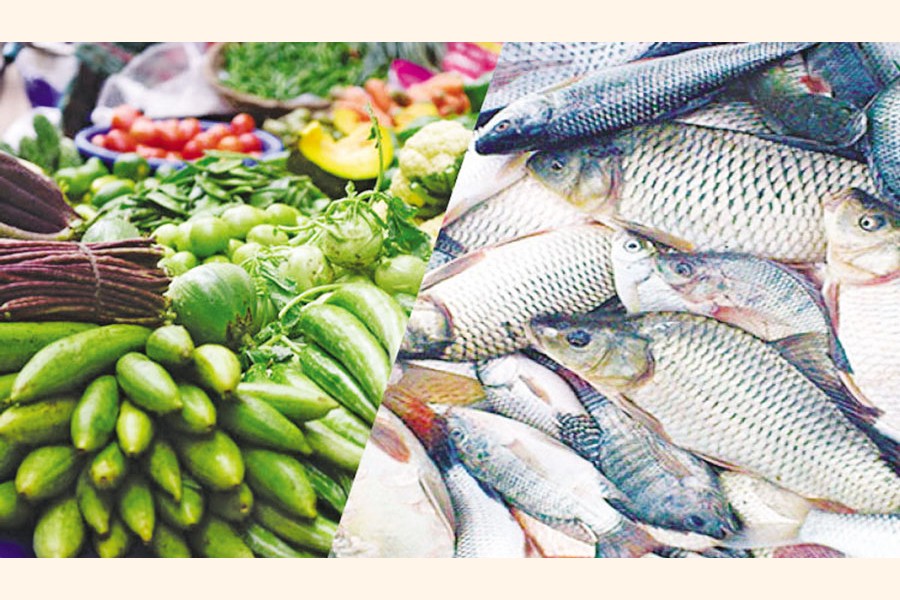A diverse diet is the key to good nutrition. In South Asia, however, diets have been traditionally cereal-heavy - in Bangladesh, about 70 per cent of daily energy intake per person comes from cereals. Our diets need to be diversified urgently, and two categories of 'nutrient-dense' foods are particularly important - fruits and vegetables, and animal source foods, i.e. eggs, milk and meat. The vitamins and minerals in these food groups are critical to many aspects of our wellbeing, such as cognitive development, good eyesight, adequate socio-emotional abilities, and healthy immune systems. Fruits and vegetables also offer protection against diseases like heart ailment, stroke and cancer. Animal source foods are important in preventing child stunting and the lifelong disadvantage that stunting brings. In Bangladesh, over 50 per cent of children and women of reproductive age are affected by micronutrient deficiency - lack of vitamins and minerals. Around 36 per cent of children under the age of five are stunted, 14 per cent are wasted, and 33 per cent are underweight and 22 per cent of children are born with low birth weights. While providing nutrient supplements or fortifying foods offers important help in addressing specific deficiencies, dietary diversification, with particular reference to nutrient-dense foods, holds the key to holistic progress.
However, South Asia has a long way to go in this regard. For example, in Bangladesh, according to Bangladesh Bureau of Statistics 2018, average fruit and vegetable intake is only 203.8 grams per person per day compared to the WHO benchmark of 400 grams/person/day. The ratios of vegetable expenditure and fruit expenditure to the total food expenditure are only 9.24 per cent and 3.77 per cent respectively. While the overconsumption of some animal source foods has potentially negative implications for health and the environment, despite being ranked 12th for livestock production, Bangladesh is currently at the other end of the spectrum, amongst the lowest consumers of meat and milk in the world on average. Even these averages do not paint the full picture, and there are significant segments of the population - often the poorest - who consume much less.
How can this situation be improved? We would argue that the key lies in understanding the markets for nutrient-dense foods and supporting these markets to deliver these foods affordably and equitably. In South Asia we have good experience in improving the consumption of producers, e.g. via home gardens. This is very important, but to spread the benefits of nutrient-dense foods to the wider population, including the poorest and the landless, we need the market mechanism to make these foods widely available and more affordable for all.
Often the tendency, when thinking about markets, is to focus on the upstream parts of the value chains, e.g. connecting farmers to markets, improving farm storage, etc. These are vital first steps in encouraging nutrient-dense food production, getting more produce in the market and eventually lowering prices for consumers. How can we ensure that the market system puts these nutrient-dense foods within the reach of the poor and nutritionally vulnerable? This is not an easy challenge. In a research project called Market Intervention for Nutritional Improvement (MINI), we have investigated this question in Jashore of Bangladesh and in Bihar of India. One implication of our findings is that some value chain 'upgrades' that connect farmers to wider markets have the consequence of pushing produce into premium market channels that serve the better-off in cities such as Dhaka, Khulna, Faridpur, etc. There is no much incentive for supplying the produce to smaller, less lucrative markets in small towns and rural areas, where many poor live.
These smaller, more neglected markets are often characterised by poor transport connectivity, inadequate market facilities and infrastructure and poor integration into information systems on prices, arrivals, etc. A major challenge with both major categories of nutrient-dense foods is that they are marked by high perishability and spoilage, and are prone to food safety hazards. These problems are multiplied in small markets, where there is typically no cold storage and little infrastructure or information available to handle food safely. All of this reduces the incentive for produce to flow towards these markets.
So we need a strategy that applies a consumption and equity lens to markets for nutrient-dense foods, focusing on neglected markets and the downstream areas of value chains. This could include developing market information systems that include small markets, investing in small-scale, inexpensive market-side cold storages at small markets, upgrading market facilities more generally, and designing market-based food safety interventions that are appropriate for these markets. At the same time, it is important that behaviour change, and other consumer-focused strategies are used to boost demand for nutrient-dense foods amongst the populations served by these markets.
Fundamentally, the need of the hour is to think of markets for nutrient-dense foods not only from a farmer's perspective as we are used to, but also from the consumption, nutrition and equity perspective. These markets are supported by appropriate policies and they are capable of delivering nutritious foods in an affordable and efficient way.
In the United Nations Food System Summit 2021 (UNFSS21) held on 23rd September 2021, Prime Minister Sheikh Hasina provided five directives including nutrition, resilience, and an inclusive food system. For achieving those directives, inclusive markets that better balance the interests of producers and consumers, including the poorest, are a must.
Prof. Dr. Bhavani Shankar is an economist researching food system and nutrition linkages at the University of Sheffield, UK. Twitter: Bhavani1Shankar
Dr. Mohammad Jahangir Alam is a Professor at the Department of Agribusiness and Marketing, Bangladesh Agricultural University, Mymensingh-2202, Bangladesh.
alambau2003@yahoo.com


